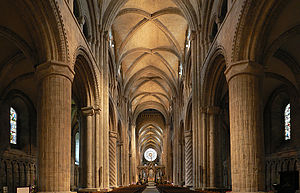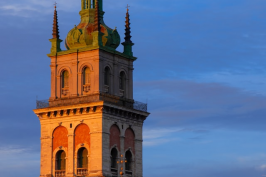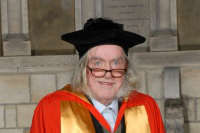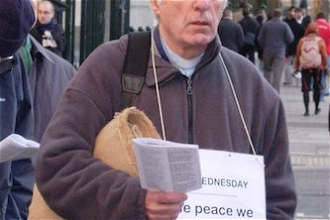Seventeenth century Scottish soldiers commemorated in Durham

Durham Cathedral - Wiki image
Seventeenth century Scottish soldiers, who were imprisoned and died in Durham Cathedral and Castle following the Battle of Dunbar against Oliver Cromwell's troops in 1650, are being commemorated today with a series of events in the city.
Durham University is hosting an event to dedicate a new plaque, as a lasting memorial to the soldiers who lost their lives in Durham. A minute’s silence will also be observed. The plaque has been installed in the courtyard of the café at University’s Palace Green Library, within the City’s UNESCO World Heritage Site. It was during construction work for this courtyard that the remains of the soldiers were discovered in a mass grave in 2013.
Speaking ahead of the event Professor Stuart Corbridge, Vice-Chancellor and Warden of Durham University, said: “The plaque will serve as a permanent memorial to the soldiers’ presence here on Palace Green. Since the discovery of the remains in 2013, experts from the University’s Department of Archaeology have undertaken a significant programme of research to learn more about the lives of the soldiers, including what became of those who survived. It is our intention through this project to give these individuals a voice in our history.”
Mounted on stone cut from the quarry located on the site where the Battle of Dunbar took place in 1650, the plaque’s inscription and imagery were designed in consultation with stakeholders including direct descendants of soldiers who survived the battle and subsequent imprisonment.
A plaque within Durham Cathedral, installed in 2011 in memory of the Scottish soldiers, has also been updated to remove the reference to the soldiers’ place of burial being unknown. The updated plaque will be rededicated today, with special prayers and a blessing during the Cathedral’s Evensong service.
Canon Rosalind Brown, of Durham Cathedral, said: “The updated plaque within Durham Cathedral, and the new plaque at Palace Green Library, provide an important commemoration of those soldiers who lost their lives and one which we hope honours their memory in a dignified manner.”
This evening there will be a public lecture about the Scottish Soldiers and the research into the remains is also being held at Palace Green Library.
Stone for the newly installed plaque at Palace Green Library was donated by Tarmac, who removed it from their quarry which is on the site of the Battle of Dunbar. Work to create and install the plaque was undertaken by specialist contractors at St Astier, based in County Durham.
Following discovery of the remains in November 2013, analysis by experts from the University’s Department of Archaeology concluded that they were those of Scottish soldiers taken prisoner after the 1650 Battle of Dunbar, solving a near 400 year old mystery about what became of those soldiers who died in Durham.
Research on the remains is ongoing and has so far revealed fascinating details about the early lives of soldiers and their health.
In autumn 2016 the research team also visited the USA to learn more about what became of soldiers who survived imprisonment in Durham and were later transported to areas including Massachusetts to work as indentured servants.
Professor David Cowling, Pro-Vice-Chancellor of Arts and Humanities at Durham University, said: “Through the discovery of these remains, and the ongoing research on them, we have been granted a privileged insight into the lives of the soldiers.
“The University plans to share their stories through an exhibition at Palace Green Library in 2018 which will be entitled Lost Lives, Hidden Voices: Unlocking the Story of the Scottish Soldiers 1650-2018. Our hope is that this exhibition will give people the opportunity to learn more about the lives of these soldiers, and the fascinating archaeological research which has helped us to get to know them better.”
The Battle of Dunbar was one of the most brutal and short battles of the 17th Century civil wars, after which thousands of soldiers were marched over 100 miles from the South East of Scotland to Durham in North East England. Around 3,000 soldiers were imprisoned in Durham Cathedral and Castle by Cromwell's forces in the Cathedral.
Those that survived imprisonment in Durham were transported to different parts of the world including France and New England, USA, where they worked as indentured servants.
Research on the remains is being undertaken by Durham University’s Department of Archaeology. The aim is to learn more about where the soldiers came from, their health and what illnesses they suffered from at different stages of their lives.
Once research on the remains is completed they will be reburied at the Elvet Hill Road Cemetery in Durham City, close to where the remains were originally found. The decision on where to rebury the remains was taken following extensive consultation and mindful of the University’s ethical, moral and legal responsibilities.
For further information please go to www.durham.ac.uk/scottishsoldiers
See a video about the project here: www.youtube.com/watch?v=gE983NP-WGI





















